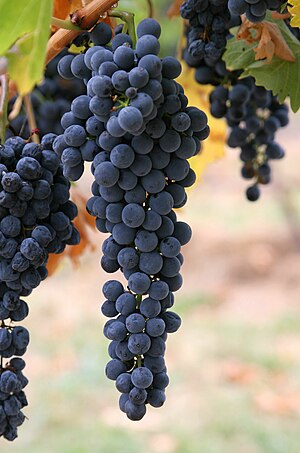 Image via WikipediaDuring the beginning stages of making red wine, the grapes that have been picked are put into a crusher. Here, the crusher will gently break the skins of the grapes. Depending on what type of wine is being made and the tannin that’s required, the stalks will either be crushed along with the grapes, or discarded. Next, the grapes are put into a fermentation vat with the skins. This can be a long process, taking several weeks to complete. If a higher temperature is used, more tannin and color will be extracted from the grapes.
Image via WikipediaDuring the beginning stages of making red wine, the grapes that have been picked are put into a crusher. Here, the crusher will gently break the skins of the grapes. Depending on what type of wine is being made and the tannin that’s required, the stalks will either be crushed along with the grapes, or discarded. Next, the grapes are put into a fermentation vat with the skins. This can be a long process, taking several weeks to complete. If a higher temperature is used, more tannin and color will be extracted from the grapes.When making soft wines, the whole grapes are fermented using sealed vats. The carbon dioxide that becomes trapped in the sealed vats ferments the grapes under pressure, which is normally a quick process, taking only a few days. Keep in mind, the color and tannin content of the wine is based on how long the fermenting process takes. If the fermenting process takes a long time, the wine will generally hold more flavor and color.
The remaining bulk of the grapes will go through a press, being crushed to create a tannic wine. Sometimes, this tannic wine is added with a free run wine in order to add a bit more structure to the wine blend. Both the press and vat wine are then mixed and transferred to either tanks or barrels for a second fermentation. The second fermentation will take the longest, and it brings out the quality and taste in the wine.
 Image via WikipediaAll types of fine red wine will spend a minimum of a year in the barrels. Some types of red wine will spend a lot more time in the barrels, possibly several years. Red wine is also fine tuned with egg whites, which will suspend the yeast and other solids found in the wine downwards, before the wine is racked, filtered, and eventually bottled. Once the wine has been bottled, it is then shipped off and sold. Some wine however, will be stored for a period of time in the bottle before it is offered for sale.
Image via WikipediaAll types of fine red wine will spend a minimum of a year in the barrels. Some types of red wine will spend a lot more time in the barrels, possibly several years. Red wine is also fine tuned with egg whites, which will suspend the yeast and other solids found in the wine downwards, before the wine is racked, filtered, and eventually bottled. Once the wine has been bottled, it is then shipped off and sold. Some wine however, will be stored for a period of time in the bottle before it is offered for sale.The time a wine spends in the bottle is very important, although not every wine needs to spend a lot of time in the bottle. The more complex and more expensive types of red wine will benefit the most from aging in the bottle, to preserve flavor and color. The more simple types of red wine however, don’t need to spend much time at all in the bottle before drinking.
Either way, red wine can be a very delicious accompaniment to many meals.

No comments:
Post a Comment
We welcome comments and suggestions!